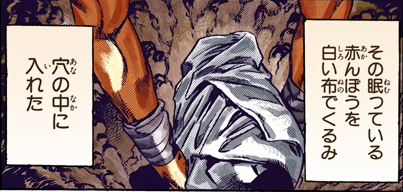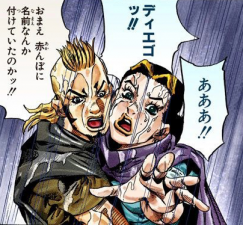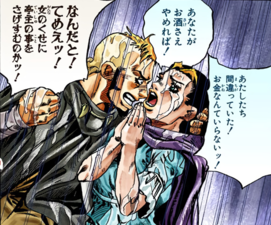Dario (Steel Ball Run): Difference between revisions
No edit summary |
|||
| Line 41: | Line 41: | ||
==Personality== |
==Personality== |
||
Dario is cruel and callous, |
Dario is cruel and callous, showing no remorse for infanticide and leaving his family for dead. Although both parents had apparently made the decision together to bury their newborn baby, it can be assumed that it was mainly at Dario's insistence, based on his cruel personality and the fact that he took the most active role in the burial. Prone to flying into a rage, his abusive nature is apparent when he beats his wife for suggesting that his alcoholism is contributing to their poverty. A man void of any sense of responsibility, he sees his wife and child as nothing more than a burden, overjoyed at the prospect of getting rid of them both. |
||
==History== |
==History== |
||
===[[Steel Ball Run]]=== |
===[[Steel Ball Run]]=== |
||
Living in an impoverished village in rural England, Dario was displeased with the miserable conditions of his life when his [[Diego Brando's Mother|wife]], then about 16 or 17 years old, gave birth to a [[Diego Brando|baby boy]] in 1870. Believing themselves too poor to be be able to care for their child, they carried the newborn into the mountains to bury him. |
Living in an impoverished village in rural England, Dario was already displeased with the miserable conditions of his life when his [[Diego Brando's Mother|wife]], then about 16 or 17 years old, gave birth to a [[Diego Brando|baby boy]] in 1870. Believing themselves too poor to be be able to care for their child, they carried the newborn into the mountains to bury him. Dario was shown to have dug the grave, placed the baby inside, and filled the hole with dirt himself while his wife stood by. |
||
As they were leaving, a heavy downpour of rain flooded the area. The inundation carried the baby Diego down the river, and upon seeing him drowning, Diego's mother immediately regretted her decision, calling out his name. Dario |
As they were leaving, a heavy downpour of rain flooded the area. The inundation carried the baby Diego down the river, and upon seeing him drowning, Diego's mother immediately regretted her decision, calling out his name. Dario was appalled to hear that she had given a name to the child, and promised that they could have more children once they had a stable life. When she suggested that their financial situation could improve if he stopped drinking, Dario became enraged and beat her to the ground. This did not crush her resolve, however, and she bravely swam into the river to save her son. |
||
From a safe distance, Dario watched the two as they were swept away by the current, laughing at their misfortune before leaving. To him, it seemed apparent that the mother and child would surely drown in the flood, and he was pleased with himself for "getting rid" of both of them. |
|||
Although Dario is never seen or heard from again within the story, his abandonment played a considerable role in shaping Diego Brando's hatred for the world. At the farm, Diego and his mother were looked down upon with scorn because the absence of a husband effectively rendered Diego a bastard in their eyes, which was highly stigmatized in Victorian England. Diego directly blamed the farm workers' apathy towards his mother's suffering on that social stigma, and vowed to get revenge on all of them for letting her die, as well as his father for abandoning them in the first place. |
Although Dario is never seen or heard from again within the story, his abandonment played a considerable role in shaping Diego Brando's hatred for the world. At the farm, Diego and his mother were looked down upon with scorn because the absence of a husband effectively rendered Diego a bastard in their eyes, which was highly stigmatized in Victorian England. Diego directly blamed the farm workers' apathy towards his mother's suffering on that social stigma, and vowed to get revenge on all of them for letting her die, as well as his father for abandoning them in the first place. |
||
In 1890, twenty years after Dario's |
In 1890, twenty years after Dario's abscondence, [[Hot Pants]] reported that he was still alive, and that she could help Diego find him. As an adult, Diego's vicious contempt had not dulled at all; the mere mention of his father caused him to scream in her face in a raw display of rage and pain. It is unclear whether Hot Pants was telling the truth about Dario's status, but the promise of being able to track down his father was ultimately what convinced Diego to partner with her. |
||
==Chapters== |
==Chapters== |
||
Revision as of 05:58, 25 January 2023
Dario (ダリオ, Dario) is a tertiary character featured in the seventh part of JoJo's Bizarre Adventure, Steel Ball Run. An abusive alcoholic without regard for anyone but himself, his abandonment of his family left Diego Brando and his mother in abject poverty. This set in motion a chain of events that became the impetus driving Diego's primary ambition: to get revenge on Dario and the rest of society that wronged him and his mother.
Appearance
Dario is a man of average height and build. His light-colored hair is shaved on the sides with a tuft in the front, and kept long in the back. In contrast to his fair hair, he sports a dark goatee and sideburns. His eyebrows are also dark and have the same prominent arch as his son's. Typical for a rural peasant, his attire consists of a simple cloak, tunic, and pants. He is also shown wearing cloth bracers on his wrists.
Color Schemes
Personality
Dario is cruel and callous, showing no remorse for infanticide and leaving his family for dead. Although both parents had apparently made the decision together to bury their newborn baby, it can be assumed that it was mainly at Dario's insistence, based on his cruel personality and the fact that he took the most active role in the burial. Prone to flying into a rage, his abusive nature is apparent when he beats his wife for suggesting that his alcoholism is contributing to their poverty. A man void of any sense of responsibility, he sees his wife and child as nothing more than a burden, overjoyed at the prospect of getting rid of them both.
History
Steel Ball Run
Living in an impoverished village in rural England, Dario was already displeased with the miserable conditions of his life when his wife, then about 16 or 17 years old, gave birth to a baby boy in 1870. Believing themselves too poor to be be able to care for their child, they carried the newborn into the mountains to bury him. Dario was shown to have dug the grave, placed the baby inside, and filled the hole with dirt himself while his wife stood by.
As they were leaving, a heavy downpour of rain flooded the area. The inundation carried the baby Diego down the river, and upon seeing him drowning, Diego's mother immediately regretted her decision, calling out his name. Dario was appalled to hear that she had given a name to the child, and promised that they could have more children once they had a stable life. When she suggested that their financial situation could improve if he stopped drinking, Dario became enraged and beat her to the ground. This did not crush her resolve, however, and she bravely swam into the river to save her son.
From a safe distance, Dario watched the two as they were swept away by the current, laughing at their misfortune before leaving. To him, it seemed apparent that the mother and child would surely drown in the flood, and he was pleased with himself for "getting rid" of both of them.
Although Dario is never seen or heard from again within the story, his abandonment played a considerable role in shaping Diego Brando's hatred for the world. At the farm, Diego and his mother were looked down upon with scorn because the absence of a husband effectively rendered Diego a bastard in their eyes, which was highly stigmatized in Victorian England. Diego directly blamed the farm workers' apathy towards his mother's suffering on that social stigma, and vowed to get revenge on all of them for letting her die, as well as his father for abandoning them in the first place.
In 1890, twenty years after Dario's abscondence, Hot Pants reported that he was still alive, and that she could help Diego find him. As an adult, Diego's vicious contempt had not dulled at all; the mere mention of his father caused him to scream in her face in a raw display of rage and pain. It is unclear whether Hot Pants was telling the truth about Dario's status, but the promise of being able to track down his father was ultimately what convinced Diego to partner with her.
Chapters
- Steel Ball Run Chapter 30: Scary Monsters, Part 3 (Flashback)
- Steel Ball Run Chapter 73: D4C, Part 6 (Flashback)
Quotes
- “You had a name for that child? Don't! He must have died a long time ago!”—Dario, Steel Ball Run Chapter 30: Scary Monsters, Part 3
- “Once we have a stable life, we can have as many babies as we want! We'll have another baby someday! That one died in the flood, okay?”—Dario, Steel Ball Run Chapter 30: Scary Monsters, Part 3
- “Hah! Now I got rid of both of them... Good riddance!”—Dario, Steel Ball Run Chapter 30: Scary Monsters, Part 3
- “He's alive... Your father's name is Dario. Your father who intended to let you and your mother die when you were a baby. I know that information as well... I can find him easily.”
Gallery
References
- ↑ Steel Ball Run Chapter 73: D4C, Part 6 P.34.




